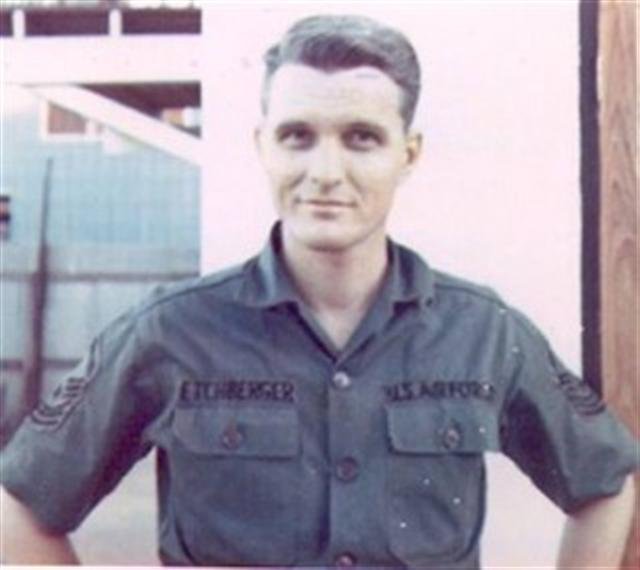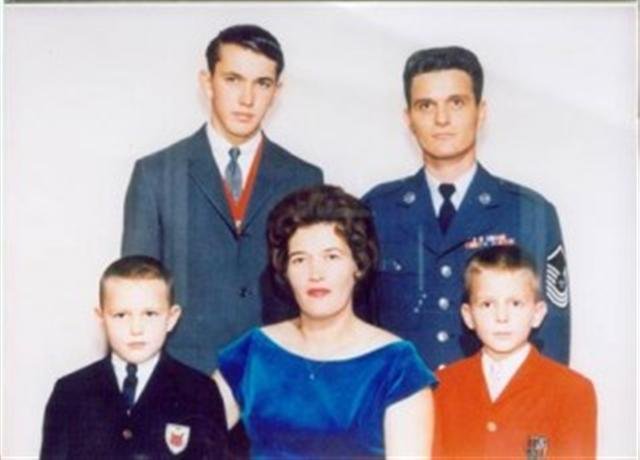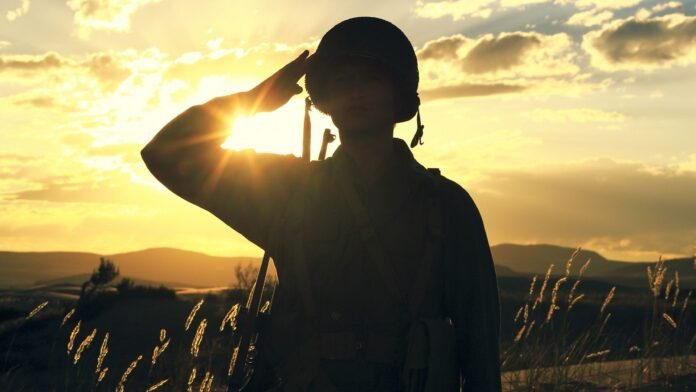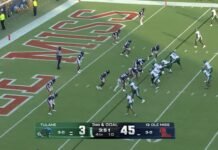Years after hushed-up death, the airman’s sacrifice recognized
By Elizabeth Chuck
They weren’t supposed to be there. Then again, neither were their enemies.
![]() The 16 U.S. airmen of the 1st Combat Evaluation Group were stationed atop a 5,600-foot mountain that towered above the Laotian jungle. Before daybreak on March 11, 1968, the first rocket dropped. Then grenades were hurled and gunshots came whizzing by. North Vietnamese soldiers had infiltrated the Air Force’s secret “Lima Site 85” – and few Americans would leave alive.
The 16 U.S. airmen of the 1st Combat Evaluation Group were stationed atop a 5,600-foot mountain that towered above the Laotian jungle. Before daybreak on March 11, 1968, the first rocket dropped. Then grenades were hurled and gunshots came whizzing by. North Vietnamese soldiers had infiltrated the Air Force’s secret “Lima Site 85” – and few Americans would leave alive.

The Air Force used the covert U.S. radar base, which was 20 miles from the Vietnamese border, to guide U.S. bombers to and from targets in North Vietnam and Laos. But because Laos was officially a neutral country in the conflict, the U.S. troops were there in violation of the Geneva Agreement. So before sending them to Lima Site 85, military officials told the airmen they would operate in Laos under the cover of being civilian technicians who worked for Lockheed Aircraft Services.
During the fierce attack that day in March more than 42 years ago, 11 U.S. airmen lost their lives. But five survived — at least three of them thanks to the heroic actions of Chief Master Sgt. Richard L. “Dick” Etchberger, who never made it home. As the Vietnamese closed in on the outnumbered Americans, Etchberger put himself in the line of fire to load wounded servicemen into the rescue chopper before scrambling in himself. But just as the helicopter climbed to safety, a final round pierced the bottom, hitting and killing Etchberger, 35.
On Tuesday, the Hamburg, Pa., the native will be awarded the Medal of Honor by President Barack Obama for his bravery and sacrifice at Site 85.
“He was the ranking man. It was all on his shoulders,” said retired Tech. Sgt. John G. Daniel, one of the men Etchberger shuttled to safety. “He got us out alive. If it hadn’t been for him, I would have been dead.”
A clandestine job – and death – revealed
The Laos mission was so secret that the only other people briefed on it were the airmen’s wives – and they weren’t allowed to tell their children what their fathers had been doing, even after they died.
Hillary Price, a spokeswoman for Rep. Earl Pomeroy, D-N.D., who has been advocating for Etchberger to receive the Medal of Honor, said the airman was nominated for the award when he was killed, but then-President Lyndon Johnson rejected the recommendation because of the secrecy of the mission in Laos. Instead, he received the Air Force Cross, the service’s second-highest military decoration.
Cory Etchberger was 9 when his dad was killed.
“For years, I had thought he died in a helicopter accident,” he said. “People ask me all the time, ‘Didn’t you think it was kind of strange that your dad got the Air Force Cross for a helicopter accident?’ And I would say, ‘Doesn’t everyone in a helicopter accident get that?’”
It wasn’t until 1983, when the Air Force declassified the mission, that Etchberger’s three sons found out the real story from their mother, Catherine. “She kept her promise to the Air Force,” Cory Etchberger said.
Before being deployed to Vietnam, Etchberger was stationed in Bismarck, N.D., a connection that prompted Rep. Pomeroy to take up his cause in 2004.
Price, Pomeroy’s spokeswoman, said the congressman has several signed affidavits and letters from Defense Department employees on file pressing for Etchberger to receive the Medal of Honor.
But when msnbc.com asked the Pentagon for more information, officials said they could find no records of a nomination prior to the current one.
“The Air Force has no record that anything ever went beyond an Air Force Cross submission,” Lt. Col Ann Stefanek, a Pentagon media officer, told msnbc.com on Tuesday. “A lot of media outlets, including some official Air Force documents, have incorrectly reported that shortly after his death, the Medal of Honor submission went all the way up to President Johnson.” In fact, the Air Force vice chief downgraded the nomination to an Air Force Cross, she said, and a quiet ceremony was held shortly thereafter.
Retired Col. Jack Jacobs, a Vietnam vet, NBC military analyst and 1969 Medal of Honor recipient, said that political calculations could plausibly have torpedoed the effort to honor Etchberger at the time.
Acknowledging that Etchberger was serving in Laos would be admitting the U.S. had violated international agreements, which would almost certainly have inflamed the growing anti-war sentiment in the country, he said.
“We had about half a million troops in Vietnam and we had a draft on, too, which made the war wildly unpopular,” Jacobs said. “We were in combat all the time, and it was not unusual for us to have dozens of casualties in an engagement. We would attack a hill and lose 40 guys.”
Lone outpost
American commanders suspected Vietnamese troops had reached Site 85 before the attack and dispatched choppers, hoping to reach the airmen before their opponents did.
But the choppers hadn’t arrived yet when the men “heard a lot of voices we didn’t understand, and a lot of grenades,” said Daniel, the retired tech sergeant who was with Etchberger that night.
Daniel watched two bullets kill the airman next to him, then he got hit in both legs. He yelled to Etchberger – the highest-ranking officer at Site 85 – who was about 10 yards away, and uninjured.
“I said, ‘Dick, what do we do?’ At that time, I had the only working radio. I couldn’t move because I didn’t have no legs.”
Etchberger instructed him to radio in an airstrike. The bombs dropped but were hardly effective. When dawn broke, Daniel saw American casualties everywhere. “We thought, ‘Well, that’s it, we’re done for.’” Minutes later, a rescue chopper was hovering over them, extending slings down to the ground to pull the men out of danger. Etchberger pulled Daniel off the ground and loaded him and two other airmen into the sling, one by one.
“There was this one other guy on top of the hill, alive, that we didn’t know about. He and Dick both got in the sling.” Then another round of bullets came, these ones directed at the chopper. “Somebody in the ground got up and emptied his rifle, and one hit Dick (through the bottom of the chopper), and he bled to death.”
Daniel blacked out after getting on the helicopter and didn’t learn of Etchberger’s death until he woke up in a hospital in Thailand. He’ll be at the White House when Obama presents Etchberger’s Medal of Honor at Tuesday’s ceremony.

‘An excellent human being’
“He was a good sergeant; we’d chat when we were working. He was just an excellent human being.”
Maj. Stanley Sliz, the only other airman rescued from Site 85 that day who is still living, served with Etchberger for eight years. Now 78 and living in California, he is unable to attend Etchberger’s ceremony.
“I considered him the consummate professional. He stood up above everybody else,” Sliz said.
“All of us were selected for the job, so we were the cream of the crop. I’m so proud of him for getting the Medal of Honor because I consider him the point man for all of us. Everybody up there on the hill deserves a Medal of Honor.”
It wasn’t until 2008, when Congress waived the two-year time limit for Medal of Honor eligibility, that Etchberger’s youngest son Cory started to believe his father would finally be recognized.
President Obama will present the award to Cory and Etchberger’s two other sons, Rich Etchberger and Steve Wilson. Etchberger’s wife died in 1994.
The White House presents the award to military members who distinguish themselves “conspicuously by gallantry above and beyond the call of duty.” By “exposing himself to enemy fire in order to place his three surviving wounded comrades in the rescue slings,” Etchberger displayed “immeasurable courage and uncommon valor.”
A quiet man who never lost his temper, Etchberger always led by example, whether it was on the battlefield or at home with his family, Cory Etchberger said.
“He grew up in the Depression era,” Cory said. “To go from a small town to Medal of Honor recipient is pretty special and quite humbling.”
Etchberger is not the only serviceman to be honored many years after his death. The Union Army’s 1st Lt. Alonzo Cushing is scheduled to receive the Medal of Honor later this year — 147 years after he died at age 22. Badly wounded in the Civil War battle of Gettysburg, he refused to give up on his short-handed unit and fought until the final moments of his life, according to his commendation.











